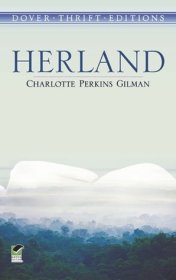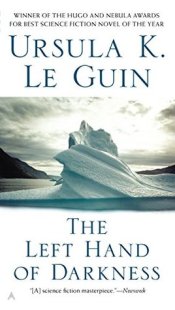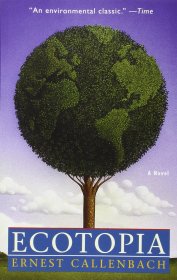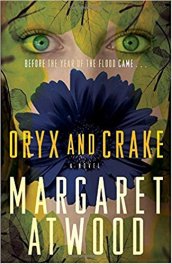Unless you have been contentedly nesting your days away under a rock, I’m sure you have witnessed the all-pervading media buzz surrounding Hulu’s new TV series based off of Margaret Atwood’s The Handmaid’s Tale. It’s a great watch, but also a great read. Befitting the resurgence in attention to Atwood’s feminist dystopia, I’ve put together a summer reading list of more imagined societies for you to explore. I originally read these books for my own casual literary research, which concentrates on ecofeminist criticism, and consequently every book covers both feminist and/or environmental themes in some regard. In addition, there’s a mix of both blissful utopias and disturbing dystopias, emerging cultures and *post-apocalyptic struggles. So if you need something to occupy your afternoons this summer (other than binge-watching netflix), take a trip to your nearest bookstore and buy a ticket to one of these strange lands, which might not be so far-off from future realities of our own…
*(And of course, if eco-apocolypse is your thing, check out Jean Hegland’s Into the Forest, originally published by CALYX Books.)
The Handmaid’s Tale by Margaret Atwood

“Offred is a Handmaid in the Republic of Gilead. She may leave the home of the Commander and his wife once a day to walk to food markets whose signs are now pictures instead of words because women are no longer allowed to read. She must lie on her back once a month and pray that the Commander makes her pregnant, because in an age of declining births, Offred and the other Handmaids are valued only if their ovaries are viable.”
Just in case you have been living under that rock, I’ll make this quick pitch: read The Handmaid’s Tale! It’s a contemporary classic of feminist literature, and in view of the skillful and chillingly memorable writing, it’s no mystery why.
The Cleft by Doris Lessing

“In the last years of his life, a Roman senator embarks on one final epic endeavor, a retelling of the history of human creation. The story he relates is the little-known saga of the Clefts, an ancient community of women with no knowledge of nor need for men. Childbirth was controlled through the cycles of the moon, and only female offspring were born—until the unanticipated event that jeopardized the harmony of their close-knit society: the strange, unheralded birth of a boy.”
As always, Lessing’s sharply raw and unusual writing widens eyes. After finishing a book of hers, you’re left with a slight seasickness, as if your world has been tilted a few degrees and everything you thought you knew grips uneven terrain– The Cleft is no exception to this, but rather a prime example. The women, who once lived a placidly uneventful and synchronized existence with their environment, are suddenly faced with the emergence of man-against-nature struggle when the first human boys are brought into their society. However, while I expected this book to be a black and white ode to feminine power in its original and unoppressed state, what I received instead was a complex picture: of the countless mistakes made by two imperfect genders in an emerging humanity, and how these genders came to fall into the distinctly structured roles that dominate our history.
Herland by Charlotte Perkins Gilman

“Gilman employs humor to engaging effect in a story about three male explorers who stumble upon an all-female society isolated somewhere in South America. Noting the advanced state of the civilization they’ve encountered, the visitors set out to find some males, assuming that since the country is so civilized, “there must be men.”
Upon finishing the first third of this book, I easily knew it would become a new favorite of mine. If you’ve read Charlotte Perkins Gilman’s short story “The Yellow Wallpaper”, you already know how wonderful her writing is. Herland paints a world so vivid and incandescently beautiful that you’ll immediately want to go run away and live in it. And it’s more than just a pleasant fairytale daydream– although this book is set in an earlier time period, the themes are far from antiquated; the explorers’ struggle with overcoming masculine ideals, the ground-breaking visions of environmental compassion, and the unconventional reverence for motherhood all strike home in both mind and heart.
The Left Hand of Darkness by Ursula K. Le Guin

“The Left Hand of Darkness tells the story of a lone human emissary to Winter, an alien world whose inhabitants can choose -and change – their gender. His goal is to facilitate Winter’s inclusion in a growing intergalactic civilization. But to do so he must bridge the gulf between his own views and those of the completely dissimilar culture that he encounters.”
Now more than ever the constructs of gender are being critiqued and rethought, which makes the fact that Ursula K. Le Guin published this book 48 years ago even more impressive. As a stirring anthropological exploration of sexuality from the standpoint of an alien culture, The Left Hand of Darkness has irrevocably imprinted itself in the realm of science fiction. It was within the borders of this entirely gender neutral and sexually shifting society that I first became an ardent Le Guin fan, and I now recommend it to anyone else willing to immerse themselves in its pages.
Ecotopia by Ernest Callenbach

“Ecotopia was founded when northern California, Oregon, and Washington seceded from the Union to create a “stable-state” ecosystem: the perfect balance between human beings and the environment. A woman-dominated government has instituted such peaceful revolutions as the twenty-hour workweek and employee ownership of farms and businesses. On a sanctioned visit to Ecotopia, New York Times-Post reporter Will Weston meets a sexually forthright Ecotopian woman and undertakes a relationship whose intensity will lead him to a critical choice between two worlds.”
Out of my reading list, this environmental classic is the only novel written by a man, and Callenbach certainly satisfies my ecofeminist agenda with his layering of feminist overtones. In fact, Ecotopia features the same archetype as Herland and The Left Hand of Darkness: a skeptical male protagonist entering a utopia whose core values and beliefs entirely conflict with his own, whereupon his worldviews are altered through the influence of progressively-minded women. Embodying the principle of “show, don’t tell”, Callenbach models to us that the socially constructed concepts we take for granted are best restructured through a submersive experience in the foreign mindset. And as a reader, you get to accompany Will Weston on his exploration of Ecotopia, not only watching his opinions change, but feeling your own preconceptions evolve along with his.
The Parable of the Sower by Octavia E. Butler

“Lauren Olamina and her family live in one of the only safe neighborhoods remaining on the outskirts of Los Angeles. When fire destroys their compound, Lauren’s family is killed and she is forced out into a world that is facing apocalypse. With a handful of other refugees, Lauren must make her way north to safety, along the way conceiving a revolutionary idea that may mean salvation for all mankind.”
The Parable of the Sower, the first book in Butler’s unfinished Earthseed trilogy, explores themes of both women and nature. From what I’ve seen, reviews of this book are almost entirely high praise. Admittedly, I haven’t read this yet since it’s at the end of my summer reading list, so we’ll have to read this one together! I’m personally planning on finishing at least the first of Butler’s two Earthseed books before college starts up again.
Oryx and Crake by Margaret Atwood

“Snowman, known as Jimmy before mankind was overwhelmed by a plague, is struggling to survive in a world where he may be the last human, and mourning the loss of his best friend, Crake, and the beautiful and elusive Oryx whom they both loved. In search of answers, Snowman embarks on a journey–with the help of the green-eyed Children of Crake–through the lush wilderness that was so recently a great city, until powerful corporations took mankind on an uncontrolled genetic engineering ride.”
As things begin, so they should end. Perhaps you’ve already read The Handmaid’s Tale, but have yet to quench your thirst for Atwood’s writing and would like to read some more of her work. In my opinion, Oryx and Crake is a fantastic follow-up. In Atwood’s construction of a world rampant with genetic modifications and riddled by questions of love, Mother Nature occasionally meets with themes of maternal devotion. And if you can make it to the second book, The Year of the Flood, the plot is even more female-centric. Familiar themes of environmental concern are made fresh with dry humor, so give it a go.
Read up, and enjoy!
– Rhiannon Schaub, Intern
